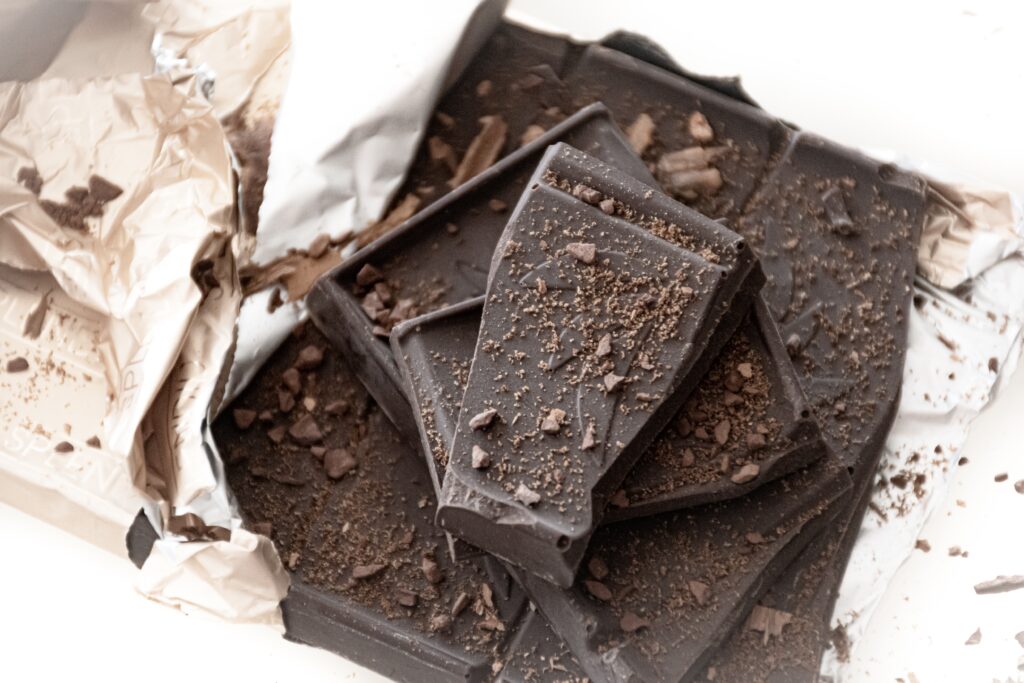
Dark Chocolate:In moderate amounts, the antioxidants and minerals found in dark chocolate with high cocoa content may potentially reduce your risk of heart disease. However, it can be somewhat high in calories and sugar.
There are many health benefits of eating dark chocolate as it contains abundant nutrients.
The largest trace amounts of antioxidants are in this product, which is made from the seeds of the cocoa tree.
According to studies, dark chocolate has health benefits and may reduce the risk of heart disease.
The health benefits of dark chocolate (or cocoa) have been proven by scientific research.
Dark Chocolate Very nutritious
You can get a lot of nutrition from high-quality dark chocolate.
Minerals are abundant, and it contains a respectable amount of soluble fiber.According to one reliable source, one hundred grams of 70% to 85% cocoa dark chocolate bar contains:
eleven grams of fiber
Iron DV is 66%
About 57% of the daily value of magnesium
DV has copper content of 196% and manganese content of 85%
It also contains calcium, phosphorus, zinc and selenium in abundance.
Needless to say, 100 grams (3.5 ounces) is a substantial amount and should not be consumed on a daily basis. With these beneficial ingredients, you’ll get 600 calories and moderate sugar levels.Moderation is key when it comes to dark chocolate.
Both dark chocolate and cocoa have healthy fatty acid profiles. Primary fatty acids include oleic acid, stearic acid, and palmitic acid, all of which are beneficial for heart health and are also present in olive oil.
When it comes to cholesterol in the body, stearic acid is neutral. Despite its ability to raise cholesterol levels, palmitic acid accounts for less than a third of all fat calories.
Although dark chocolate contains stimulants such as theobromine and caffeine, dark chocolate is much less potent than the latter and therefore is not likely to make you more sleepy.
Powerful source of antioxidants
Oxygen radical absorption capacity is abbreviated as ORAC. It determines the amount of antioxidants present in foods.
Simply put, scientists test the antioxidant power of food by exposing it to harmful free radicals and seeing how effectively the food’s antioxidants neutralize them. Research has shown that chocolate is an excellent source of antioxidants. Since ORAC values are determined in a laboratory, their applicability in real-world situations is debatable. The antioxidant benefits of chocolate have been the subject of conflicting findings in human studies. Nevertheless, professionals agree that at this time we do not have enough data to draw any firm conclusions. The chemical components found in abundance in dark chocolate have biological activities and work as antioxidants. These include catechins, polyphenols, and flavanols. Combine dark chocolate with other foods like almonds and cocoa, and you may find that your LDL (“bad”) cholesterol levels go down. This is because dark chocolate contains polyphenols. According to one study, among the fruits examined, acai and blueberries, cocoa and dark chocolate had the highest levels of antioxidant activity, polyphenols and flavanols.
May improve blood flow and lower blood pressure
The flavonoids in dark chocolate have the ability to trigger the production of nitric oxide (NO) by the endothelium, the lining of the arteries (5).Sending messages to the arteries to relax reduces blood flow resistance and, in turn, lowers blood pressure; This is one of the activities of NO.
Although the benefits are often modest, several controlled studies have shown that dark chocolate and cocoa may increase blood flow and reduce blood pressure. Be careful; Only one study found any benefit in individuals with both type 2 diabetes and high blood pressure, so cocoa flavanols may have no additional benefit for people whose high blood pressure is already being treated with medication. .
May reduce heart disease risk
Dark chocolate appears to contain compounds that significantly reduce LDL oxidation.Over time, less cholesterol should build up in the arteries, reducing the chance of heart disease.In fact, studies show a significant improvement.According to several researches conducted over time, eating cocoa or chocolate rich in flavanols can improve heart health and reduce blood pressure. A meta-analysis found that three servings of chocolate per week were associated with a lower risk of heart disease. There was a 9% reduction in risk. There was no clear benefit from increasing chocolate consumption. According to another research, eating 45 grams of chocolate weekly reduced the risk of heart disease by 11%. More than 100 grams per week has no positive effect on health
Almonds with or without dark chocolate reduced LDL cholesterol in a 2017 clinical study.Despite the encouraging results, further research is needed to determine whether the reduction in risk was due to the chocolate or something else.Consuming dark chocolate on a regular basis may reduce the risk of heart disease, as the underlying biological process is well documented (lower blood pressure and lower oxidation-prone LDL).
Could improve brain function
Your brain works better after eating dark chocolate. According to research, consuming cocoa with high flavanol content can increase cerebral blood flow in young individuals. This may be the reason why regularly consuming cocoa improves focus, verbal learning, and memory. Additionally, cocoa flavonoids may reduce the likelihood of progression to dementia and may aid cognitive function maintenance in elderly individuals with mild cognitive impairment. In any case, additional studies are needed. Another possible explanation for cocoa’s short-term effects on cognitive performance is the presence of stimulant chemicals such as caffeine and theobromine.
